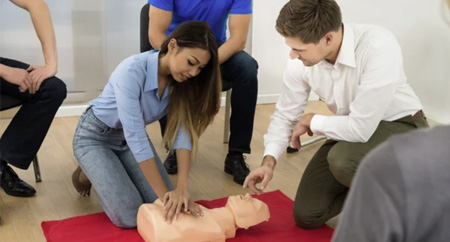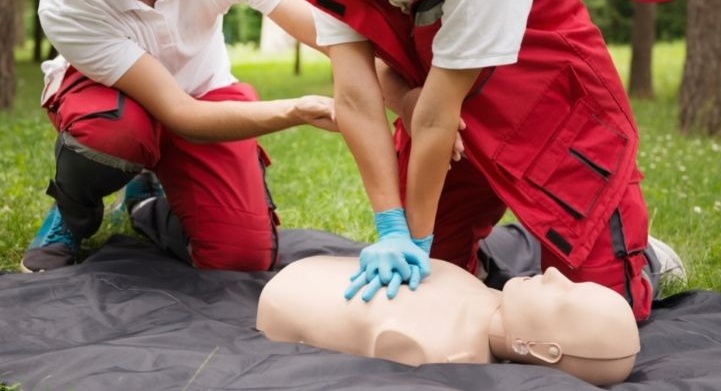Introduction
In today's hectic world, the ability to respond promptly and effectively in emergency situations can be a video game changer. With accidents occurring daily, having the skills to provide first aid or perform CPR (Cardiopulmonary Resuscitation) is vital. But is enlisting in a first aid and mouth-to-mouth resuscitation program really worth it? After all, time and resources are precious commodities.
In this write-up, First Aid Course Newcastle we dive deep right into the experiences of our students who have actually taken these vital training courses. They share insights concerning their motivations for enrolling, what they learned, and just how it transformed their outlook on emergency situations. By exploring their direct accounts together with research-backed info, we'll address the burning question: Is a First Aid and Mouth-to-mouth Resuscitation Course Worth It? Below's What Our Pupils Say.
The Value of Emergency treatment Training
Why Ought to You Think about a First Aid Course?
First aid training outfits people with the knowledge and abilities needed to provide prompt support throughout medical emergency situations. Whether it's dealing with minor injuries like cuts and contusions or dealing with lethal circumstances such as cardiac arrests, a first aid course encourages you to act emphatically when every second counts.
Benefits of Taking an Emergency Treatment Course
Taking a first aid course supplies numerous benefits:
Life-Saving Skills: One of the most considerable benefit is unquestionably the ability to conserve lives. Confidence Boost: With knowledge comes confidence; learners feel even more ready to deal with emergencies. Community Impact: Trained individuals can contribute positively to their areas by supplying support when needed. Career Advancement: Several occupations call for emergency treatment certification, making it a possession for job seekers. Personal Safety: Recognizing how to take care of accidents or health issues at home guarantees safety and security for family members members.Understanding mouth-to-mouth resuscitation: An Important Skill
What Exactly is CPR?
CPR stands for Cardiopulmonary Resuscitation; it's an emergency situation treatment carried out when a person's heart beat or breathing has actually quit. This technique includes breast compressions integrated with man-made air flow (mouth-to-mouth), which assists maintain blood flow and oxygenation until professional clinical assistance arrives.

Types of CPR Courses Available
When exploring CPR training courses, you'll discover various types customized for various audiences:
- Basic Life Assistance (BLS): Ideal for healthcare providers. Heartsaver CPR: Developed for laypeople without clinical training. Pediatric CPR: Focused on methods relevant to children and infants.
Is Understanding CPR Difficult? A Pupil's Perspective
Many students express problem regarding whether discovering mouth-to-mouth resuscitation will be tough. Generally speaking, while it requires method and understanding of certain techniques, most people find that hands-on training makes it much easier to understand crucial concepts.
First Help Certification: A Vital Credential
Why Get an Emergency treatment Certificate?
A first aid certification signifies that you've obtained formal training in providing aid during emergency situations. It acts as evidence of your skills in taking care of important scenarios safely and effectively.
How Long Does Qualification Last?
Typically, first aid certificates stay valid for two years prior to needing renewal through re-training or correspondence course. This policy makes sure First Aid Course Darwin that people stay updated on present practices and strategies in emergency response.
Student Experiences: What Do They Say About Their Training?
Real Stories from Our Graduates
Our students have shared effective testimonials showing their trips through first aid and CPR training courses:
"I never ever assumed I 'd need this training up until my youngster choked someday at dinner."
"After taking the program, I seemed like I can handle any type of circumstance that came my means."
"The hands-on technique made all the difference; I truly feel ready now."
"I took this course because my work required it yet wound up obtaining so much a lot more."
"There's something incredibly equipping regarding recognizing you can aid a person in distress."
"I went into it cynical but left knowing I can conserve lives."
Is a First Aid and Mouth-to-mouth Resuscitation Program Well Worth It? Below's What Our Trainees Say
Taking right into account our trainees' responses exposes consistent motifs about their experiences with first aid and mouth-to-mouth resuscitation courses:
Many students highlight increased self-confidence post-training. The practical elements are typically highlighted as specifically beneficial. Graduates often mention feeling equipped to manage real-life emergency situations quickly after finishing their courses. The psychological fulfillment originated from having the ability to help others is consistently cited as an important outcome of the training.These beliefs jointly verify that indeed, an emergency treatment and mouth-to-mouth resuscitation course is indeed worth it!
Key Takeaways from Trainee Evaluations on Emergency Treatment Courses
What Pupils Learned Throughout Their Training
Students report obtaining skills ranging from standard wound treatment strategies to sophisticated emergency situation reaction methods:
- Understanding exactly how to analyze an emergency scenario promptly Identifying symptoms of cardiovascular disease or strokes Performing effective chest compressions Utilizing automated exterior defibrillators (AEDs)
Each element adds substantially in the direction of improving one's preparedness for unforeseen scenarios.
How Training Altered Their Overview on Emergencies
Many trainees revealed that after completing these training courses, they no longer checked out emergency situations as frustrating but instead as obstacles they might handle properly with the right skills at hand.
The Role of Instructors in First Aid Training
Why Top quality Instructors Matter in Emergency Treatment Courses?
The effectiveness of any emergency treatment course greatly depends on its instructors' quality-- knowledgeable trainers bring real-world circumstances right into classrooms, making lessons relatable and engaging.
Attributes of Effective Emergency treatment Instructors
Strong communication skills Ability to simplify complicated concepts Engaging mentor methods Empathy towards students' concernsStudents frequently discuss their trainers' excitement for the subject contributed considerably to their general experience.
First Help Courses vs Online Training Programs: Which is Better?
Comparing Typical Courses with Online Options
While online first aid courses provide adaptability in learning at your very own rate, standard class settings supply straight interaction with teachers-- making them suitable for hands-on practice sessions that are critical in grasping life-saving techniques.
Pros & Cons Table of Each Training Method
|Function|Standard Training courses|Online Courses|| ---------------------------|-----------------------|------------------------|| Hands-On Technique|Yes|No|| Flexibility|Restricted|High|| Interaction|Straight|Online|| Immediate Feedback|Yes|Limited|
Based on these variables, lots of trainees favor registering for traditional courses in spite of on the internet options being readily available as a result of their focus on sensible skill development.
FAQs Regarding Emergency treatment and CPR Courses
FAQ 1: How long does it require to complete an emergency treatment or mouth-to-mouth resuscitation course?
Most first aid training courses typically range from 4 to 8 hours relying on the depth of web content covered while extensive courses may call for several days over several weeks leading up towards certification examinations if applicable.
FAQ 2: Can anyone take an emergency treatment and CPR course?
Absolutely! These courses are designed for anybody interested irrespective of previous medical understanding-- whether you're a moms and dad desiring assurance or someone seeking employment needing training.

FAQ 3: Will certainly I receive accreditation upon completion?
Yes! Upon completing your coursework effectively along with passing necessary assessments you will certainly gain both accreditations verifying your skills!
FAQ 4: Are there age restrictions for participating?
Generally talking there aren't rigorous age limitations nonetheless minors might need adult approval prior to registering specifically if working in the direction of obtaining official certifications.

FAQ 5: What must I anticipate during hands-on training sessions?
Expect interactive activities where you'll exercise methods like bandaging wounds performing rescue breathing utilizing mannequins and so on, under advice from certified instructors!
FAQ 6: Can I renew my accreditation online?
Many companies now supply choices enabling existing certificate holders renew existing credentials through on the internet correspondence course although some may still prefer in person re-training sessions!
Conclusion
In verdict, spending time right into taking an emergency treatment and CPR program is not just an instructional endeavor; it's a crucial action towards individual development while outfitting oneself with life-saving abilities essential today especially given uncertain nature surrounding us daily!
With many success tales emerging from pleased graduates who have actually transformed situations right into chances via proper action-- it ends up being clear why a lot of echo similar beliefs when asked if going after such programs confirms worthwhile!
So if you're still asking yourself whether "Is a First Aid and Mouth-to-mouth Resuscitation Course Worth It?" remember what our trainees state loudest-- it absolutely is!